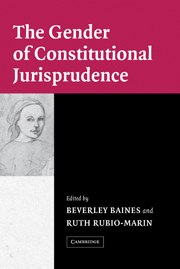Book contents
- Frontmatter
- Contents
- List of Contributors
- Acknowledgments
- The Gender of Constitutional Jurisprudence
- Introduction: Toward a Feminist Constitutional Agenda
- 1 Speaking into a Silence: Embedded Constitutionalism, the Australian Constitution, and the Rights of Women
- 2 Using the Canadian Charter of Rights and Freedoms to Constitute Women
- 3 Emancipatory Equality: Gender Jurisprudence under the Colombian Constitution
- 4 Gender Equality and International Human Rights in Costa Rican Constitutional Jurisprudence
- 5 Constituting Women: The French Ways
- 6 Gender in the German Constitution
- 7 India, Sex Equality, and Constitutional Law
- 8 Constitutional Transformation, Gender Equality, and Religious/National Conflict in Israel: Tentative Progress through the Obstacle Course
- 9 “No Nation Can Be Free When One Half of It Is Enslaved”: Constitutional Equality for Women in South Africa
- 10 Engendering the Constitution: The Spanish Experience
- 11 Gender Equality from a Constitutional Perspective: The Case of Turkey
- 12 Gender and the United States Constitution: Equal Protection, Privacy, and Federalism
- Index
- References
8 - Constitutional Transformation, Gender Equality, and Religious/National Conflict in Israel: Tentative Progress through the Obstacle Course
Published online by Cambridge University Press: 14 January 2010
- Frontmatter
- Contents
- List of Contributors
- Acknowledgments
- The Gender of Constitutional Jurisprudence
- Introduction: Toward a Feminist Constitutional Agenda
- 1 Speaking into a Silence: Embedded Constitutionalism, the Australian Constitution, and the Rights of Women
- 2 Using the Canadian Charter of Rights and Freedoms to Constitute Women
- 3 Emancipatory Equality: Gender Jurisprudence under the Colombian Constitution
- 4 Gender Equality and International Human Rights in Costa Rican Constitutional Jurisprudence
- 5 Constituting Women: The French Ways
- 6 Gender in the German Constitution
- 7 India, Sex Equality, and Constitutional Law
- 8 Constitutional Transformation, Gender Equality, and Religious/National Conflict in Israel: Tentative Progress through the Obstacle Course
- 9 “No Nation Can Be Free When One Half of It Is Enslaved”: Constitutional Equality for Women in South Africa
- 10 Engendering the Constitution: The Spanish Experience
- 11 Gender Equality from a Constitutional Perspective: The Case of Turkey
- 12 Gender and the United States Constitution: Equal Protection, Privacy, and Federalism
- Index
- References
Summary
Open any traveler's guidebook about Israel, and you will soon find a photo of a young woman in military uniform carrying a weapon. She is the female soldier. Just like her male peers, she is subject to mandatory conscription to the defense forces when she reaches the age of eighteen. Her image is an emblem of gender equality. Unfortunately, the status of women in Israel does not match the mythology this image suggests. This gap between myth and reality makes Israel a living laboratory for the study of women's rights. As a Jewish and democratic state, it hosts a constant battle over its religious, national, and cultural identity, as well as engaging daily with internal and external challenges to its very existence. In each of these struggles, women's rights, among others, are tested to the limit. This chapter provides an overview of the current status of women's rights in Israel. Our intention is to analyze how, why, and under what conditions individual women and feminist organizations have been successful in advancing the gender equality agenda through constitutional rights jurisprudence and legislative initiatives. We also hope to evaluate the limits of such change by addressing the nature of the enduring inequalities that Israeli women still face in navigating the obstacles of a deeply divided society.
Our discussion is divided into three major sections. We begin with an outline of pertinent elements of Israel's unique constitutional system.
- Type
- Chapter
- Information
- The Gender of Constitutional Jurisprudence , pp. 205 - 229Publisher: Cambridge University PressPrint publication year: 2004
References
- 2
- Cited by



